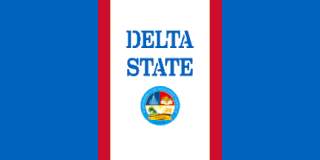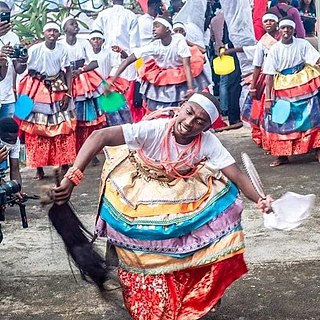Related Research Articles

The Izon people or Izon Otu, otherwise known as the Ijaw people due to the historic mispronunciation of the name Izon, are an ethnic group majorly found in the Niger Delta in Nigeria, with significant population clusters in Bayelsa, in Delta, and in Rivers. They are also found in other Nigerian states like Ondo, and Edo State. Many are found as migrant fishermen in camps as far west as Sierra Leone and as far east as Gabon. Population figures for the Ijaws are placed at just over 4 million, accounting for 1.8% of the Nigerian population. They have long lived in locations near many sea trade routes, and they were well connected to other areas by trade as early as the 15th century.

Delta State is a state in the South-South geopolitical zone of Nigeria. Named after the Niger Delta—a large part of which is in the state—the state was formed from the former Bendel State on August 27, 1991. Bordered on the north by Edo State, the east by Anambra and Rivers States, and the south by Bayelsa State while to the west is the Bight of Benin which covers about 160 kilometres of the state's coastline. The State was initially created with 12 local government areas in 1991 which was later extended to 19 and now has 25 local government areas. Asaba as its state capital is located along the River Niger on the northeastern end of the State, while the state's economic centre is the twin cities of Warri and Uvwie

The culture of Nigeria is shaped by Nigeria's multiple ethnic groups. The country has 527 languages, seven of which are extinct. Nigeria also has over 1150 dialects and ethnic groups. The three largest ethnic groups are the Hausas that are predominantly in the north, the Yorubas who predominate in the southwest, and the Igbos in the southeast. There are many other ethnic groups with sizeable populations across the different parts of the country. The Kanuri people are located in the northeast part of Nigeria, the Tiv people of north central and the Efik-Ibibio are in the south south. The Bini people are most frequent in the region between Yorubaland and Igboland.

The Niger Delta is the delta of the Niger River sitting directly on the Gulf of Guinea on the Atlantic Ocean in Nigeria. It is located within nine coastal southern Nigerian states, which include: all six states from the South South geopolitical zone, one state (Ondo) from South West geopolitical zone and two states from South East geopolitical zone.
Yenagoa is a Local Government Area and capital city of Bayelsa State, southern Nigeria. It is located at the southern part of the country at coordinates 4°55′29″N6°15′51″E.

The Itsekiri are one of the Yoruboid subgroup of Nigeria's Niger Delta area, Delta State. The Itsekiris presently number 2.7 million people and live mainly in the Warri South, Warri North and Warri South West local government districts of Delta State on the Atlantic coast of Nigeria. Significant communities of Itsekiris can be found in parts of Edo and Ondo states and in various other Nigerian cities including Lagos, Benin City, Port Harcourt and Abuja. Many people of Itsekiri descent also reside in the United Kingdom, the United States and Canada. The Itsekiris are closely related to the Yoruba of South Western Nigeria and also close to the Okpe people and Edo peoples. The Itsekiris traditionally refer to their land as the Kingdom of Warri or 'Iwere' as its proper name – which is geographically contiguous to the area covered by the three Warri local government districts. The area is a key centre of Nigeria's crude oil and natural gas production and petroleum refining and the main town Warri forms the industrial and commercial nucleus of the Delta State region.

The current conflict in the Niger Delta first arose in the early 1990s over tensions between foreign oil corporations and a number of the Niger Delta's minority ethnic groups who feel they are being exploited, particularly the Ogoni and the Ijaw. Ethnic and political unrest continued throughout the 1990s despite the return to democracy and the election of the Obasanjo government in 1999. Struggle for oil wealth and environmental harm over its impacts has fueled violence between ethnic groups, causing the militarization of nearly the entire region by ethnic militia groups, Nigerian military and police forces, notably the Nigerian Mobile Police. The violence has contributed to Nigeria's ongoing energy supply crisis by discouraging foreign investment in new power generation plants in the region.

The Kalabari are a sub-group of the Ijaw people living in the eastern Niger Delta region of Nigeria. Originally, they were known as the Awome. The name Kalabari was derived from their ancestor Perebo Kalabari who was a son of Mein Owei. Their original settlement was spelt as Calabar by the Portuguese which was pronounced Kalabari. This settlement (town) was abandoned as the people moved to other fishing settlements. Portuguese settlers continued to maintain the name Calabari which became surrounded by the Efik people of Duke town. When the British came the word Calabari was pronounced as Calabar (Kalaba) instead of Kalabari. At this time the original Ijoid Kalabaris had moved to a new location which became the new Calabar territory since the old Calabar is occupied by different people. Old Calabar became an Efik town with time which has the name Calabar.
Ijaw Youth Council is a civil rights organization in Nigeria, founded in 1998, which supports the interests of the Ijaw ethnic group of the Niger Delta. At the point of the establishment of the IYC, leadership of the organization spread across the Nigerian states where the Ijaw people resides. Hence, in the South-South Nigeria, Pronto Douglass led the IYC while Pere Camfo was the leader of the IYC in Ondo State From 2001 to 2004, it was headed by Mujahid Dokubo-Asari, until Asari split from the movement to found the Niger Delta People's Volunteer Force.
Egbesu is the god or deity of justice of the Ijaw people of the Niger Delta region. Egbesu is also perceived as the spiritual foundational force for combating evil. The Egbesu force can only be used in defence or to correct an injustice, and only by people who are in harmony with the universe. The symbol of the divine force is the leopard, panther, and lion. Egbesu has both a philosophical and spiritual dimension, the latter of which has been more prominent during recent times due to conflicts in regions where the Ijaw reside.
The Egbema tribe also called Egbema Kingdom, of the Ijaw people live in the Delta and Edo States. The Kingdom is split politically into two different states due to the creation of Nigerian states.
The Ibani tribe is a subgroup of the Ijaw ethnic group that lives in the Bonny and Opobo areas of Rivers State, Nigeria, on the Atlantic coast. Bonny town is the tribal seat of the Ibani which is located on the bight of Bonny River. Though the Ndoki dialect of Igbo language is spoken predominantly by residents of Bonny and Opobo, the Ibani dialect of Ijaw is native to the Ibani people.
The Engenni people live in the Niger Delta region of Nigeria. They are considered to be Edoid based on linguistic grounds. They live in close proximity with Ijaw people. They primarily live in Ahoada west local government area of Rivers state, Nigeria. Although they consider themselves to be Engenni, the Engenni speak an Edoid language. Alagoa (2003) said: “---The penetration of the Niger-Delta by Edoid groups extends to the Epie-Atissa and Engenni of the central and Eastern Niger-Delta----The Epie, along with the Ogbia and other groups of the central and eastern Niger-Delta, are historically united with the Ijaw.” The other groups of the central and eastern Niger-Delta which Professor Ebiegberi Alagoa said that were historically united with the Ijaw, include the Engenni, as shown from his narrative above. The Engenni have close relations with neighbouring Ijaw tribes such as the Zarama and Epie-Atissa.
The Mein tribe of the Ijaw people lives along the Forcados River in Delta State, Nigeria. The Mein trace their origins to Benin City, via parts of the central Niger Delta. Important Mein settlements include Ogobiri and Kiagbodo.
Nembe is a Local Government Area of Bayelsa State, Nigeria. Its headquarters are in the town of Nembe in the east of the area at 4°32′22″N6°24′01″E The people of Brass, Nembe and Southern Ijaw Councils of Bayelsa State have bemoaned their neglect by oil companies operating in their areas.
The Itsekiri language is a major branch of the Yoruboid group of languages, which as a group, is a key member of the Volta–Niger sub-family of the Niger–Congo family of African languages. Itsekiri is spoken by nearly 900,000 people in Nigeria as a first language and by many others as an additional language notably in the Niger Delta and in parts of Edo and Ondo states of Nigeria. The other key members of the Yoruboid group are Yoruba and Igala along with the various Yoruba dialects spoken in Benin and Togo.

The Kingdom of Warri, Warri Kingdom or Iwere Kingdom, was established in 1480, was part of the Nigerian traditional states its ancestral Capital is based in Ode-Itsekiri, Warri South LGA, Delta State, Nigeria with a palace erected in 1950s in the multi-ethnic city of Warri, Warri South LGA, Delta State, Nigeria.
Izon (Ịzọn), also known as (Central–Western) Ijo, Ijaw, Izo and Uzo, is the dominant Ijaw language, spoken by a majority of the Ijaw people of Nigeria.
The Kaiama Declaration was issued by the Ijaw Youth Council (IYC) of Nigeria on 11 December 1998 to attribute the political crisis in Nigeria to the struggle for the control of oil mineral resources, while asserting that the degradation of the environment of Ijawland by transnational oil companies and the Nigerian State arise mainly because Ijaw people have been robbed of their natural rights to ownership and control of their land and resources. The council was formed in the town of Kaiama after 5,000 Ijaw people representing over 40 Ijaw clans, chose to articulate their aspirations for the Ijaw people, and to demand an end to 40 years of environmental damage and underdevelopment in the region.

Ogoni nationalism is a political ideology that seeks self determination by the Ogoni people. The Ogonis are one of the many indigenous peoples in the region of southeast Nigeria. They number about 1.5 million people and live in a 404-square-mile (1,050 km2) homeland which they also refer to as Ogoni, or Ogoniland. They share common oil-related environmental problems with the Ijaw people of Niger Delta.
References
- ↑ Alagoa, Ebiegberi Joe (2005). A History of the Niger Delta, Port Harcourt: Onyoma Research Publications. ISBN 978-37314-5-9